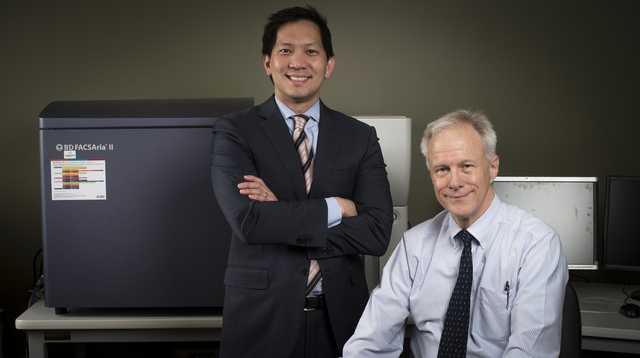 William Ho and Larry Lamb IN8bio Inc., a clinical-stage biopharmaceutical company using technology licensed in part from the University of Alabama at Birmingham, has announced United States Food and Drug Administration clearance of its Investigational New Drug, or IND, application to launch a Phase 2 clinical trial. The trial will target newly diagnosed glioblastoma, using IN8bio’s proprietary drug-resistant immunotherapy.
William Ho and Larry Lamb IN8bio Inc., a clinical-stage biopharmaceutical company using technology licensed in part from the University of Alabama at Birmingham, has announced United States Food and Drug Administration clearance of its Investigational New Drug, or IND, application to launch a Phase 2 clinical trial. The trial will target newly diagnosed glioblastoma, using IN8bio’s proprietary drug-resistant immunotherapy.
Former UAB professor of medicine Lawrence Lamb, Ph.D. — IN8bio’s executive vice president, chief scientific officer and co-founder — helped develop the technology. The study will assess safety, efficacy and tolerability of genetically modified DeltEx drug-resistant immunotherapy, or DRI, cells at leading medical centers across the United States, IN8bio reported.
The DRI technology uses gamma-delta T cells, and it is licensed from the UAB Research Foundation and two other institutions. Gamma-delta T cells are a specialized population of T cells that possess unique properties, including the ability to differentiate between healthy and diseased tissue. Glioblastoma is the most aggressive type of cancer originating in the brain.
“Obtaining clearance to begin the INB-400 Phase 2 clinical trial is an important milestone for IN8bio as it is our first company-sponsored IND,” said William Ho, chief executive officer and co-founder of IN8bio. “The clinical program is designed to eventually assess DeltEx DRI with both autologous and allogeneic approaches in both the front-line and relapsed setting. We believe the insights we unlock in glioblastoma will be essential as we apply our DeltEx platform across multiple solid tumor cancers.”
Standard-of-care treatment for glioblastoma uses temozolomide chemotherapy, or TMZ, to slow or stop the growth of the cancer cells. IN8bio’s DRI technology was developed based on two observations about TMZ.
First, when tumors are damaged by TMZ treatment, they develop stress-induced ligands on the cell surface. Normally, these signals would incite the immune watchdog gamma-delta T cells to recognize and kill the damaged tumor cells. However, the second observation reveals a problem — TMZ therapy kills lymphatic immune cells, including the gamma-delta T cells. This hinders the immune system’s ability to leverage the TMZ-induced state of increased tumor vulnerability.
In DRI, gamma-delta T cells are purified from peripheral blood mononuclear cells, and then given a gene that makes them resistant to TMZ. Next, the drug-resistant gamma-delta T cells are expanded and given to a patient, concomitantly with TMZ chemotherapy. The resistant gamma-delta T cells should then be able to recognize the stress-induced ligands on the surface of TMZ-treated tumor cells and start to eliminate them.
IN8bio is located in New York City with its primary scientific operations in Birmingham, Alabama. UAB intellectual property is licensed through the Bill L. Harbert Institute for Innovation and Entrepreneurship.
This fall, the Harbert Institute for Innovation and Entrepreneurship cited IN8bio as winner of the institute’s Innovation Award for Excellence in Entrepreneurship.